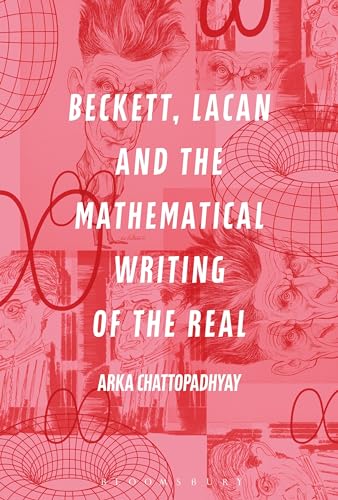Beckett, Lacan and the Mathematical Writing of the Real
Arka Chattopadhyay
BOOK REVIEW

In Beckett, Lacan and the Mathematical Writing of the Real, Arka Chattopadhyay invites readers to traverse the labyrinthine intersections of literary theory, psychoanalysis, and mathematics. This isn't just a scholarly tome; it's a profound exploration that reverberates within the mind like the haunting echoes of Beckett's own works, resonating with Lacan's intricate psychoanalytic insights. If you think you can easily categorize this book, think again. This is a challenging tapestry woven from the threads of existential despair and mathematical rigor-a journey where words collide with the abstract and the concrete.
At a first glance, one might think this is merely an analysis of two towering figures of the 20th century. Yet, Chattopadhyay delves deeper, articulating how both Samuel Beckett's enigmatic prose and Jacques Lacan's theories expose the fraught relationship between reality and representation. Imagine for a moment how your understanding of existence is shifted when you confront the unnameable void, a staple in Beckett's works, through Lacan's lens of desire and lack. This book slaps the reader awake, tearing apart the notion of a neatly packaged understanding of 'the real' and throwing you into a whirlpool from which escape seems futile.
The most philosophical debates often arise from the simplest human experiences, and Chattopadhyay exhibits this beautifully. Through an examination of mathematical language as a medium of communication, he taps into the silence at the core of Beckett's works. One cannot help but reflect: are we not, too, trapped in our own indecipherable narratives? The author's examination of Beckett's plays and prose-richly interlaced with Lacanian psychoanalysis-invites you to ponder your own existence in stark new terms.
Chattopadhyay's prose is nothing short of intoxicating. It carries an urgency that enthralls and confronts simultaneously, urging readers to reconsider their preconceived notions about both writers. For every page turned, the reader is bombarded with provocative questions that hang in the air like a Kafkaesque fog. Are we ever truly ourselves, or are we merely reflections in a distorted mirror? This text has sparked considerable debate among readers and critics alike, some applauding its daring synthesis of ideas while others lament its density and complexity. Yet, that very complexity is what makes it vital-if art is to mirror life, it must embrace the chaos of thought and emotion.
One of the more controversial aspects of this exploration is its insistence on merging mathematical discourse with literary analysis. Critics have argued that this marriage is jarring, but that's precisely where the magic occurs. Chattopadhyay forcefully contends that mathematics, often stripped of emotional nuance, holds a power that Beckett himself would find intriguing. It compels us to confront our logical frameworks while simultaneously unraveling them. When literary and mathematical thinking collide within the mind, revolutionary sparks fly, igniting a transformation that echoes through the landscapes of the human psyche.
As you journey through these pages, be prepared for a rollercoaster of emotions. You might find yourself laughing at the dark absurdity present in Beckett's humor or weeping for the characters wrestling with their existential dilemmas. Chattopadhyay ensures that the reader does not escape unscathed; instead, you'll emerge with a bruised yet bruisingly beautiful understanding of the fragility of the human experience.
This book doesn't just sit on your shelf; it demands to be read, contemplated, and debated through nights of wine and unyielding discussions. It carries a sense of urgency that resonates deeply with our historic moment of existential questioning. In a time filled with uncertainty and alienation, Chattopadhyay's work is as relevant as it is cutting-edge. It urges you to grapple with your own realities, to question the foundations of your beliefs, and to engage with the unresolvable mysteries of existence.
You owe it to yourself to read Beckett, Lacan and the Mathematical Writing of the Real. Step into the labyrinth, confront the fears lurking in its shadows, and emerge transformed. Chattopadhyay doesn't just write; he ignites a dialogue that will resonate in your mind long after the last page is turned. This is not just another academic work; it's an intellectual grenade ready to explode your preconceived notions and expose the raw, naked truths of existence. Embrace it, because the haunting voices of Beckett and Lacan have a message worth hearing-a message that rebukes complacency and challenges you to reckon with the mathematical abyss that writes the fabric of our collective real.
📖 Beckett, Lacan and the Mathematical Writing of the Real
✍ by Arka Chattopadhyay
🧾 222 pages
2018
#beckett #lacan #mathematical #writing #real #arka #chattopadhyay #ArkaChattopadhyay